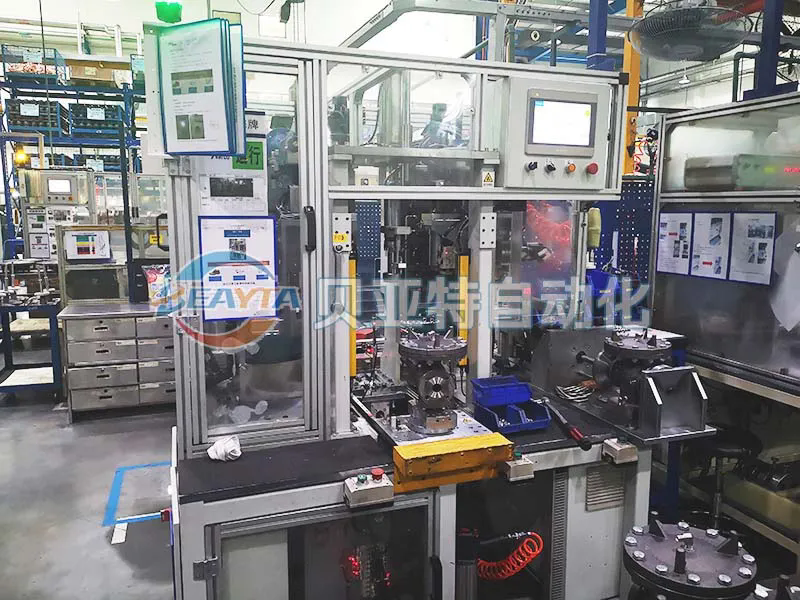How Can an Automatic Nut Tightening Machine Revolutionize Your Assembly Line?
2024-11-07
If you work in manufacturing or construction, you’re probably familiar with the repetitive and time-consuming task of tightening nuts and bolts. While this may seem like a minor part of the production process, it can significantly impact efficiency, product quality, and worker fatigue. So, how can an automatic nut tightening machine change the game for your assembly line?
What Is an Automatic Nut Tightening Machine?
An automatic nut tightening machine is a piece of equipment designed to fasten nuts onto bolts with precision and speed. These machines automate the tightening process, using preset torque values to ensure consistent and secure fastening. They are commonly used in assembly lines for industries such as automotive manufacturing, electronics, and heavy machinery, where a large number of fasteners need to be tightened accurately and quickly.
Why Is Precision So Important?
In many manufacturing processes, achieving the correct torque on a nut is crucial. Over-tightening can damage components, strip threads, or compromise the structural integrity of a product. On the other hand, under-tightening can lead to loose connections, causing mechanical failures or safety hazards. An automatic nut tightening machine eliminates the guesswork, ensuring every nut is tightened to the exact specifications required.
By using sensors and torque control mechanisms, these machines deliver consistent and repeatable results, which improves product quality and reduces the risk of defects. This precision is especially vital in industries where safety and reliability are paramount, such as aerospace and automotive sectors.
How Does It Improve Efficiency?
One of the main benefits of an automatic nut tightening machine is the significant increase in efficiency it brings to the assembly line. Here’s how:
1. Faster Operations: Manual tightening is time-consuming, especially in large-scale production. An automatic machine can tighten nuts much faster, reducing assembly time and boosting output.
2. Reduced Labor Costs: With automation handling repetitive tasks, fewer workers are needed for manual labor, allowing staff to focus on more complex or skilled tasks. This can lead to reduced labor costs and higher overall productivity.
3. Consistency and Reliability: Unlike manual processes that are prone to human error, an automatic machine delivers uniform results every time. This minimizes the need for rework and quality control checks, streamlining the workflow.
How Does It Enhance Worker Safety and Ergonomics?
Repetitive tasks like manual nut tightening can lead to worker fatigue and injuries, particularly in the hands, wrists, and arms. Over time, this can result in repetitive strain injuries (RSIs) or musculoskeletal disorders. By automating the process, workers are spared from these physically taxing activities, reducing the risk of workplace injuries.
Additionally, a safer work environment is created when workers are less fatigued and better able to focus on monitoring the equipment or handling more complex tasks. In industries where worker well-being and safety are priorities, these benefits are especially important.
Can It Be Customized for Different Applications?
Yes, one of the advantages of modern automatic nut tightening machines is their versatility. They can be configured to meet specific needs and accommodate different nut and bolt sizes, torque settings, and workpiece materials. Here are a few customization options:
- Adjustable Torque Settings: Machines can be programmed to apply different torque levels for various applications, ensuring compatibility with a wide range of components.
- Multi-Spindle Designs: For applications requiring the simultaneous tightening of multiple nuts, multi-spindle machines are available. These can greatly accelerate the production process.
- Robotic Integration: In highly automated factories, these machines can be integrated with robotic arms or conveyor systems for even greater efficiency. The integration allows for seamless operation and reduces the need for manual intervention.
Where Are These Machines Commonly Used?
Automatic nut tightening machines are widely used in industries where precision and speed are critical. Here are some examples:
- Automotive Manufacturing: From assembling engines to securing body panels, the automotive industry relies heavily on precise torque application to ensure vehicle safety and performance.
- Electronics Assembly: Delicate components in electronics require precise torque settings to avoid damage, making automated tightening essential.
- Heavy Machinery: In industries like construction and agriculture, equipment must be assembled with precision to withstand harsh conditions and heavy use.
- Aerospace: With the high safety standards required in aerospace manufacturing, accurate torque application is non-negotiable.
What Should You Consider Before Investing in One?
If you’re thinking about adding an automatic nut tightening machine to your production line, consider the following:
1. Production Volume: High-volume assembly lines benefit the most from automation, as the cost savings and efficiency gains are more significant.
2. Torque Requirements: Ensure the machine you choose can meet the torque specifications of your application. Machines with adjustable settings are ideal for diverse needs.
3. Space and Layout: Assess the available space in your facility and determine how the machine will fit into your existing production line. Some models are compact and portable, while others require more room.
4. Maintenance and Support: Like any piece of equipment, automatic machines require regular maintenance. Choose a model from a reputable manufacturer that offers reliable support and service.
Are There Any Drawbacks?
While automatic nut tightening machines offer numerous benefits, there are some limitations to consider. The initial investment cost can be high, especially for advanced models with robotic integration. However, the long-term savings in labor and increased production efficiency often justify the expense. Additionally, proper training is needed for workers to operate and maintain the machines, so consider the time and resources required for training.
Final Thoughts: Is It Worth the Investment?
In today’s competitive manufacturing landscape, efficiency, precision, and safety are more important than ever. An automatic nut tightening machine can significantly improve your assembly line's productivity and consistency, leading to higher quality products and happier, healthier workers. If you’re dealing with high-volume production or need precise torque control, investing in this technology could be a game-changer.
So, is an automatic nut tightening machine right for your operation? By evaluating your production needs, the potential benefits, and the available resources, you can make an informed decision that could transform your workflow for the better. Are you ready to embrace the future of assembly line automation?



